Lazaret, the Original Quarantine in Split
March 14, 2020 - As the coronavirus craze takes over Europe, it is good to remember that Split was once one of Europe’s leading quarantine cities.
Slobodna Dalmacija writes that it all started on the Lazaret Coast, where the Tourist Palace and taxi stand sit south of the Green Market (Pazar) today. It was here, at the end of the Middle Ages, that one of the most important commercial and health buildings on the Adriatic was built - the famous Split Lazaret.
During the periods of peace between Venice and the Ottoman Empire, with interruptions during the war years, Dalmatian cities were essential import and export ports of the Venetian-Ottoman trade: business flourished in the Republic of Dubrovnik, the Turkish Neum, but the liveliest was often in Split.
The European standard was clear - large ports had lazarets (named after St. Lazarus, the patron saint of the sick), where not only the loading and unloading of goods took place, but also the disinfection in times of frequent plagues. Namely, a strict and mandatory 40 days of quarantine were put in place in order to detect and prevent possible contagion.
The city's port, the busiest of all on the eastern Adriatic coast, lacked adequate space for these jobs. The goods were stored in the cellars of Diocletian's Palace, but the isolation of citizens from infrequently infected Eastern goods was poor.
Therefore, in the 16th century, a plan was developed to build a spacious and important lazaret for the citizens.
The draft was made by Daniel Rodriguez (Rodrigo), a Venetian Jew of Portuguese descent.
Seeing that the Turks wanted to establish its own lazaret at the mouth of the Neretva, as did the people of Dubrovnik, the Venetian Republic accepted his plan. In 1580, Rodrigo began with his own means of building a quarantine, a lazaret, and then the state continued, but under his supervision.
But everything has its price. According to art historian Dr. Dusko Keckemet, as compensation for his plan and expense, Rodrigo demanded that the Venetian Republic receive a colony of Jews exiled from Spain to Marjan, according to which its laws were much more lenient than other European countries that did not favor them.
The settled Sephardic Jews were given a part of the settlement within the walls of the Palace, an area whose name we have inherited through the informal toponym 'Get', and their successors over the centuries have left a large mark. The Lazaret of Split attracted abundant goods, not only from the Middle East but also from the Far East. Therefore, Split bore the prestigious title - 'the golden ring between the East and Venice'.
The space was rebuilt several times, and relatively quickly became one of the best-equipped lazarets in Europe at the time.
Dr. Kecskemet states that it exceeded the length of the facade of Diocletian's Palace in size.
It was about 200 meters long and about 100 meters wide.
Protective health regulations were stringent, but they did not always prevent infectious diseases. Before the quarantine was built, epidemics of "black death" were more frequent in Split, in the 14th, 15th and 16th centuries, but after the lazaret was built, they were less frequent. They were recorded in 1607, 1731, 1763 and last in 1784. The extent of the tragedy is evidenced by the fact that between March 29 and July 30, 1784, 1264 people died and the city had only a few thousand inhabitants at that time.
The lazaret had several courtyards with wells running sulfuric water for rinsing goods, health workers, security guards, caravan barns and warehouses for goods. It also included the church of Sv. Roko, which was affected by epidemics, especially plague, and a special room for conversations of isolated people with the outside world.
According to Professor Snjezana Perojevic from the Department of Construction Heritage at the Faculty of Civil Engineering, Architecture and Geodesy, goods suitable for the transmission of infection were subjected to a rigorous disinfection process, which was carried out in three primary ways: aeration, immersion, and boiling.
Washing was performed in water with vinegar or in the sea. The animals were also washed with vinegar water and had to go through the pools before entering the village. All textile raw materials, leather, fur, woven and knitted fabrics, carpets, bedspreads and even tobacco were ventilated.
The job of a disinfectant is also fascinating, as they had to spend the prescribed quarantine time with the goods and inspect it with their bare hands. After all, their good health was considered a guarantee that the goods were not infected.
Travelers arriving from the East had to spend forty days in quarantine.
Caravan traffic declined drastically in the nineteenth century, with the development of steamboats and the construction of the first modern roads to the hinterland, which was then bounded by the current border with BiH, then between the Austrian and Ottoman Empire.
Lazaret thus was transformed for the military, customs and financial purposes, and the wooden Veseljković theater was built in one of the courtyards.
Part of the space was later converted into city prisons where citizens were imprisoned until the capitulation of fascist Italy.
At the beginning of the 20th century, the citizens of Split intended to demolish the old lazaret and thus release a better view of the Diocletian's Palace from the sea.
Neither citizens nor conservationists considered it a cultural monument; such status was reserved for church and residential buildings.
As Professor Perojevic pointed out in her work, the importance of the lazaret exceeded the economic benefit, which was modest for the city. Its meaning was more social, because while the lazaret was active in Split, it was where different civilizations came together.
The first city hospital in Split was founded in 1783 by the will of the Ergovac brothers and was housed inside the Cornaro bastion.
It bore the name of St. Lazar, and was later renamed Civil Hospital. Due to significant needs, the construction of a new hospital on the outskirts of the city was sought, for which plans were made as early as 1905 but were not realized due to World War I.
With the interest of Dr. Jaksa Racic, director and then mayor, the construction of a new hospital complex at Firule began in 1931. According to scientist Livia Brisky, his first pavilion was intended to treat infectious patients.
On the hill we today call Lazarica, an infectious ward was opened in 1933.
From April 1941 data, the much larger pavilion at Firule, demolished 15 years ago to build a new maternity ward, had 62 beds and 15 cradles. As early as 1942, it was said that the infectious ward needed urgent reconstruction, and at that time, three doctors, two nurses, one analyst and six nurses worked there. On June 3, 1944, the Firule building was bombed and needed immediate rehabilitation.
The relocation of the General Hospital began in 1975 in a new complex at Firule, whose first facilities were built in 1939.
You can read more about the 16th-century Split Lazaret on TCN.
To read more about lifestyle in Croatia, follow TCN's dedicated page.
HNB Plans Structural Operation, Purchase of State Bonds to Ease Fallout from Coronavirus
ZAGREB, March 14, 2020 - The Croatian National Bank (HNB) on Friday said that the growth of the country's GDP would probably deviate from the initial forecasts to a considerable degree due to the outbreak of coronavirus, and the bank will take measures to help the economy to overcome the situation.
One of the measures which the HNB is going to conduct is a structural operation for five years at the interest rate of 0.25%, and this will be carried out on Monday, 16 March.
In addition, the HNB has started buying state bonds with the aim of maintaining stability on the market of state securities, the HNB Council said in a press release on Friday after the council's meeting.
On Thursday, the HNB stated that "in accordance with the communication of competent institutions so far, with the aim of preventing the coronavirus disease spreading, and in compliance with the measures undertaken at the level of the Republic of Croatia, the CNB (HNB) has started the implementation of measures, which apply to its key tasks, employees, business processes and business premises, that basically ensure the smooth and regular performance of all the key functions of the Croatian central bank, as well as of credit institutions supervised by the CNB."
"The measures are simultaneously directed at minimising the risk of contagion with the COVID-19 virus and its spreading."
If needed, the central bank will also apply appropriate and timely measures to ensure the continuity of work of its Council, i.e. the continuity of operational decision-making at the level of the central bank.
Supervisory requirements were sent to banks for the introduction of measures for a smooth and safe operation in epidemic conditions.
Within its supervisory function, the HNB "continuously monitors the operation of credit institutions with the main objective to maintain confidence in the banking system and promote and safeguard its safety and stability."
More coronavirus news can be found in the Lifestyle section.
Coronavirus in Croatia: 5 New Cases Brings Total to 37, Initial 2 Patients Recovered
March 14, 2020 - An update on the coronavirus in Croatia, with 5 more cases confirmed, as well two recovered cases from those initially infected.
As the COVID-19 situation in Italy continues to dominate global headlines, the latest update from Croatia is a little less alarming.
First, the good news. After one of the twins who initially contracted coronavirus in Croatia was pronounced recovered yesterday, his twin brother has also now recovered, Krunoslav Capak announced at a press conference this morning.
There are five new cases confirmed in Croatia, all of which are related to existing cases - the first cases in Osijek (2), as well as one each in Sisak, Varazdin and Zagreb.
This brings the total number of cases in Croatia so far to 37, including the two recoveries mentioned above. There have so far been no deaths in Croatia, or in any of the five neighbouring countries - Slovenia, Hungary, Serbia, Bosnia and Hercegovina, and Montenegro.
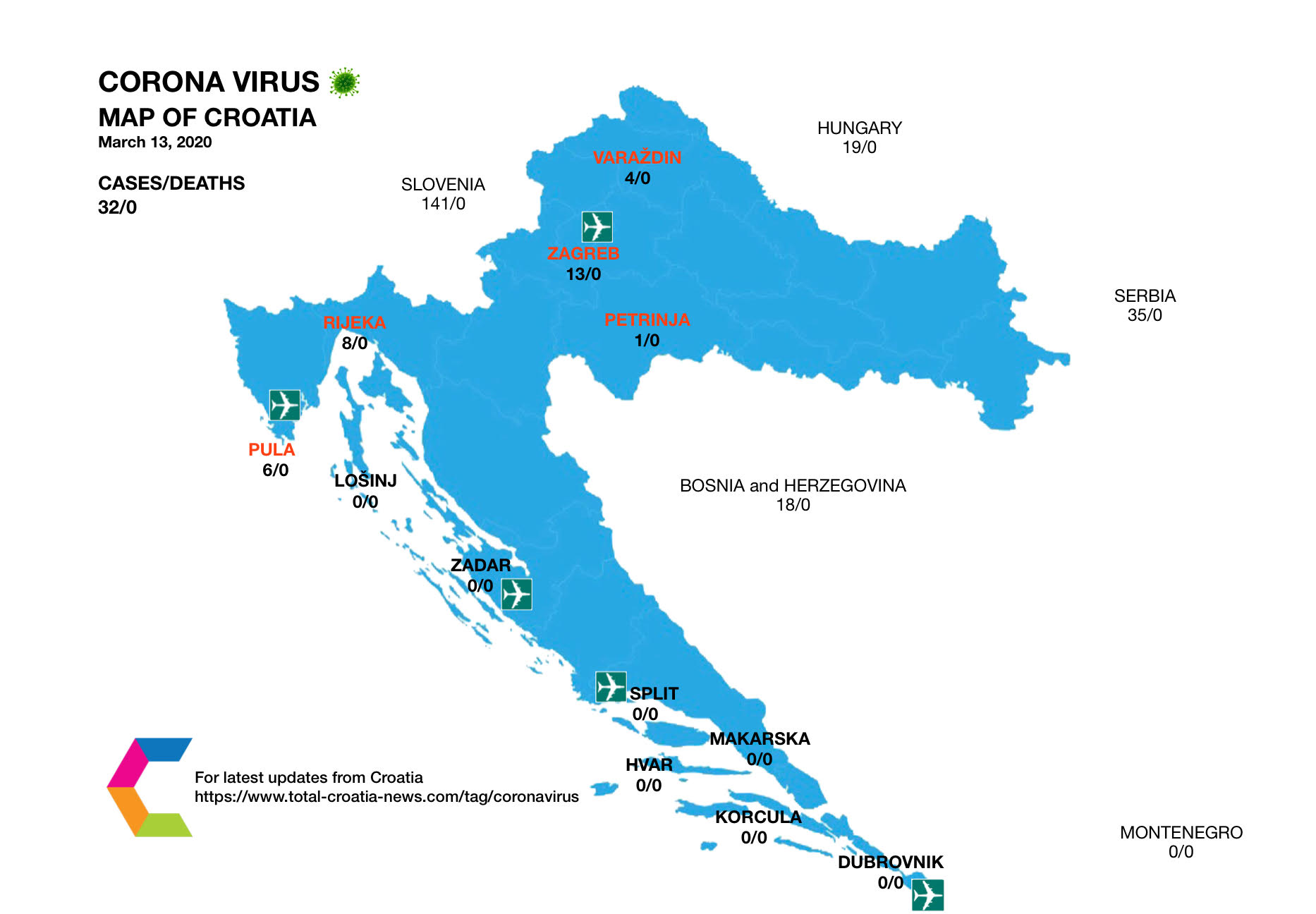
TCN is committed to giving the latest impartial updates and stats for the coronavirus in Croatia. This includes a comprehensive daily update on all aspects of the crisis (you can read yesterday's overview here), We are also provided a daily corona map of Croatia, which we will update the daily briefing this afternoon. Yesterday's map can be found above.
For those looking for more comprehensive information about different aspects of coronavirus and Croatia, follow the dedicated TCN section.
FAQ Coronavirus Croatia: Your Common COVID-19 Questions Answered
March 14, 2020 - With so many questions about coronavirus in Croatia, an attempt by Total Croatia News to cover the most common questions in our first COVID-19 in Croatia FAQ session.
Before we start, let's agree on a couple of things. With the situation changing so rapidly (who could imagine the current scenes in Italy in February, 2020, for example?), parts of this article will be out of date as soon as it is published. This is an attempt to summarise the latest info and answer the most commonly asked questions. For the very latest information, please follow our dedicated coronavirus in Croatia section here, where you will find links to all TCN articles on the virus - there are a LOT.
TCN is also producing a comprehensive daily coronavirus update on links, stats, health and travel advice - and even an updated corona map of Croatia - in these uncertain times. You can see the March 13 update here, as well as following the latest daily update on the dedicated section link in the paragraph above.
And so to those FAQs - if you have another question, please contact us at This email address is being protected from spambots. You need JavaScript enabled to view it. Subject Corona and we will do our best to answer and add to this resource below, if the topic is adequately relevant.
****
How many cases of coronavirus are there in Croatia?
The first case of coronavirus was recorded on February 25, 2020. As of time of writing (10:00 on March 14, 2020), there have been 37 confirmed cases in Croatia. 14 in Zagreb, 8 in Rijeka, 6 in Istria, 5 in Varazdin, 2 in Osijek, and one each in Sisak and Pentrinja.
2. Has anyone died of coronavirus in Croatia?
Nobody has died of coronavirus in Croatia so far, indeed the first two people infected have now recovered.
3. What is the situation in countries neighbouring Croatia?
There are also no reported fatalities in Croatia's five neighbouring countries - Slovenia, Hungary, Serbia, Bosnia and Hercegovina, and Montenegro. As you can see from the TCN March 13 update, Slovenia had 141 cases, Hungary 9, Serbia 35, BiH 18, with Montenegro currently the only country in Europe without any reported cases.
4. Are the borders of Croatia open?
Serbia has closed some borders with Croatia, and there are also freight traffic restrictions. Here is the latest updated advice from HAK - click on this link for the latest English-language updates, as well as a guide to border crossing delays.
Due to additional controls at the border crossings there can be long delays in both passenger and freight traffic.
At Batina, Principovac, Principovac 2 and Ilok 2 border crossings all traffic is suspended.
Traffic is closed at the following border crossings:
- at Goričan border crossing, detour: Goričan junction-ŽC2026-DC3;
- at Dvor and Vitaljina border crossings - open only to passenger traffic;
- at Gunja border crossing - there is a traffic ban on freight vehicles and buses.
Due to traffic bans on freight vehicles in Slovenia long delays should be expected in freight traffic at Bregana/Obrežje and Macelj/Gruškovje border crossings starting 1 June.
5. Are there any travel restrictions for people travelling to Croatia?
Yes. From the UK Government updated travel advice yesterday:
''The Croatian Government has introduced with immediate effect a compulsory fourteen-day self-isolation for all foreign nationals arriving from the UK, France, Germany, Switzerland, Spain, Austria, Netherlands, China, Korea, Japan, Singapore and Sweden.
Visitors with no residence in Croatia will be asked for proof of an accommodation booking. Those refusing self-isolation will be denied entry into Croatia and be instructed to return to their point of origin. Failure to comply with public health decisions may result in fines or even criminal charges.''
6. How badly have flights to Croatia been affected? Have there been many flight cancellations?
The picture is still a little unclear, but it is obvious that the global slowdown will hit Croatia as it should be preparing for its tourist season. Key announcements so far include Ryanair cancelling many flights and delaying their Zadar base until 2021; Korean Air temporarily halting their Zagreb route; Lufthansa stopping its Zagreb route, British Airways reducing flights to Zagreb, Norwegian cancelling 4,000 flights globally, the list goes on. While a clear picture for Croatia is yet to emerge, it seems obvious that some budget airlines have moved their seasonal route launches in some cases back to May. TCN did an overview a few days ago about the flight cancellation situation, with links to various airlines, which is probably still at least partially valid. And the links to the airlines will give you the latest official information.
7. What about connections to Italy?
The situation in Italy is alarming, and our thoughts are with those locked down and suffering. Croatia does not have a border with Italy - Slovenia is between the town countries and closed its Italian border last week - but is does have various air and sea connection. Flights to Italy have been suspended, as has the popular Ancona to Split ferry service.
8. Are schools open in Croatia?
Schools in Istria closed this week, and closures will extend to the rest of the country for an initial two weeks. Lessons will be conducted online/via television. Kindergartens and universities will also close.
Follow our intern Janja Sestak on Instagram @janja_sestak, for live video reports from Zagreb, showing us how the Coronavirus influences the daily-life of Croatian students and Universities.
9. Is there panic buying in shops in Croatia, and are there enough supplies?
Having seen the panic buying of toilet paper in Australia, are we seeing similar scenes in Croatia?
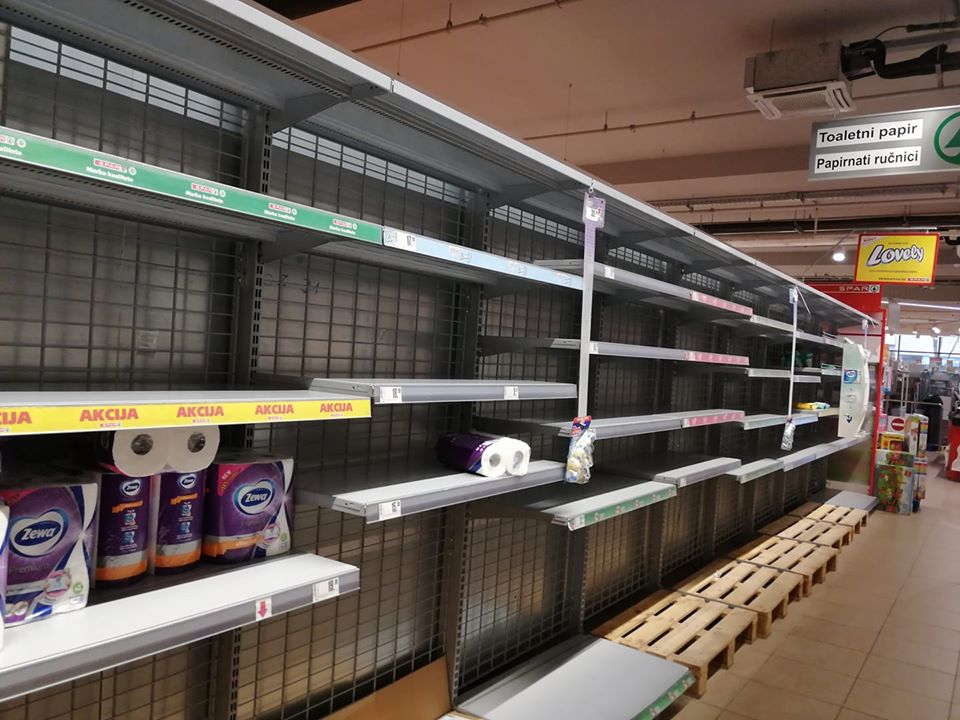
There have been photos and videos of empty shelves in Croatian supermarkets posted online - in the spirit of transparency, here is one that was posted on my Facebook wall yesterday, above (Spar in Zagreb, according to the person who posted it). I was curious to see how the toilet paper situation was in my local supermarkets in Varazdin yesterday. Not only could I buy toilet paper, but there are even an extra section offering toilet paper on special. You can see my photo report of my visit to three supermarkets here (which includes the photo below).
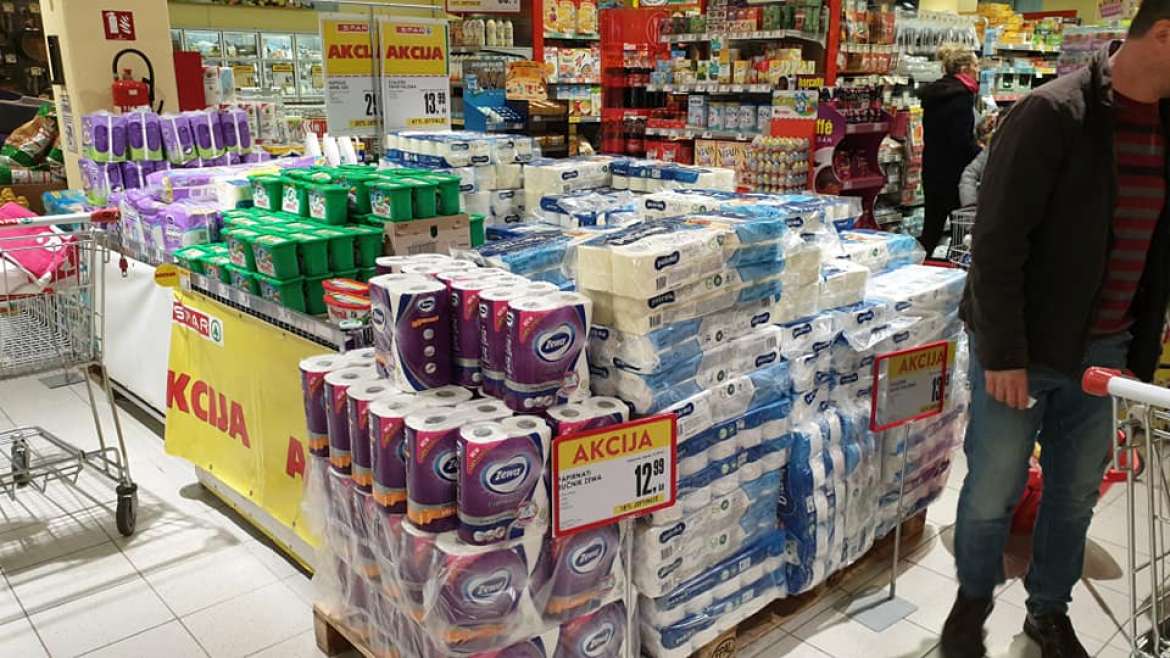
So I think it would be fair to say that the situation is far from clear-cut, but there is no real sense of panic that I can see. One other commentator on my wall offered a plausible explanation:
Rijeka also with no supply problems. If you come at the stores in the final working hours, you will find empty shelves but if you come early in the morning they will be filled with stuff.
The super/hyper markets are all understaffed in Croatia and they just can’t refill everything. Btw, in a supermarket in Rijeka today they had more than 100 packs of toilet paper, 6 euro pallets of flour, gallons of oil so no worries.
The Government set out to reassure people that they had enough reserves in this HINA article.
10. How will coronavirus affect the tourist season in Croatia?
This is of course the big question that is worrying so many people, in addition to the health risks of coronavirus itself. With more than 20% of Croatia's GDP dependent on tourism, the stakes are high, and it is clear that the impact will be significant. Valamar temporarily closed some of its hotels in Istria and Dubrovnik yesterday, the first high-profile hotel chain to take such a step, due to reduced demand and the new travel restrictions. The Ryanair announcement for Zadar yesterday is a sign of how the airlines expect the season to be in the short term. It is not really for me to speculate on how much the season will be affected later on this year, as none of us know how this crisis will develop.
11. What should I do if I think I have coronavirus in Croatia?
Official advice from the Croatian Government.
Official information and contact numbers in a previous TCN article.
12. Where can I find the most current and reliable information about coronavirus in Croatia in English?
The official Croatian Government page on Coronavirus Protection Measures.
The Croatian Institute of Public Health.
Total Croatia News dedicated coronavirus section.
13. What restrictions are in place in Croatia due to coronavirus?
As mentioned above, schools, kindergartens and universities have been closed throughout the country, effective Monday, initially for 2 weeks. Meetings of more than 100 people have also been prohibited. Ferries and flights to Italy have been suspended, and there are now self-isolation and quarantine requirements from visitors from certain countries (see section 5, above).
14. What is the general attitude of the Croatian population and government to the 2020 coronavirus crisis?
People will have different opinions as always, but from my point of view, I think the communication and coordination of information by the Croatian Government has been excellent, much better than expected. New Health Minister Vili Beros, who has been in the job just a few weeks, has had a real baptism of fire, and he has coped admirably.
The overall situation I would say is still very calm, although there is now a growing realisation of how much the tourist season will be affected. More people now are talking of self-isolating and taking a personally responsible approach. We have no idea how bad this will get or how long it will last, but Croatian people have a strong sense of community and unity in adversity, and they are used to surviving in difficult circumstances. The strengthening of community bonds could well be an unplanned positive in what is coming.
15. Is there a coronavirus map of Croatia?

Dalmatia does not have any cases yet but we were getting lots of Google searches such as 'is there coronavirus in Sibenik?' Dubrovnik, Split, Zadar and Hvar also featured heavily. All of these destinations are in the south of the country, in Dalmatia.
And so we decided to create the first corona map of Croatia, where the initial cases Varazdin, Zagreb, Rijeka and Pula were placed. By providing a map of the airports, main tourist destinations, as well as locations where cases have been confirmed, we hope to provide a clearer picture of the current situation in Croatia. This is something that is updated daily, and you can find the latest map on our dedicated section.
16. Is there a coronavirus vaccine in Croatia?
A little light-hearted humour in these challenging times.
Is there a coronavirus vaccine? is a term which is becoming increasingly popular, as people desperately search for good news and a resolution to the crisis. We are not aware of any coronavirus vaccine, and it would be global news if it were available. But Croats are a stoic nation and have a time-proven medicine which will kill most unwelcome diseases - rakija.
Stay well, and please contact us on This email address is being protected from spambots. You need JavaScript enabled to view it. Subject Corona if you have any useful additions to the resource above. Follow the latest from TCN on the coronavirus here.
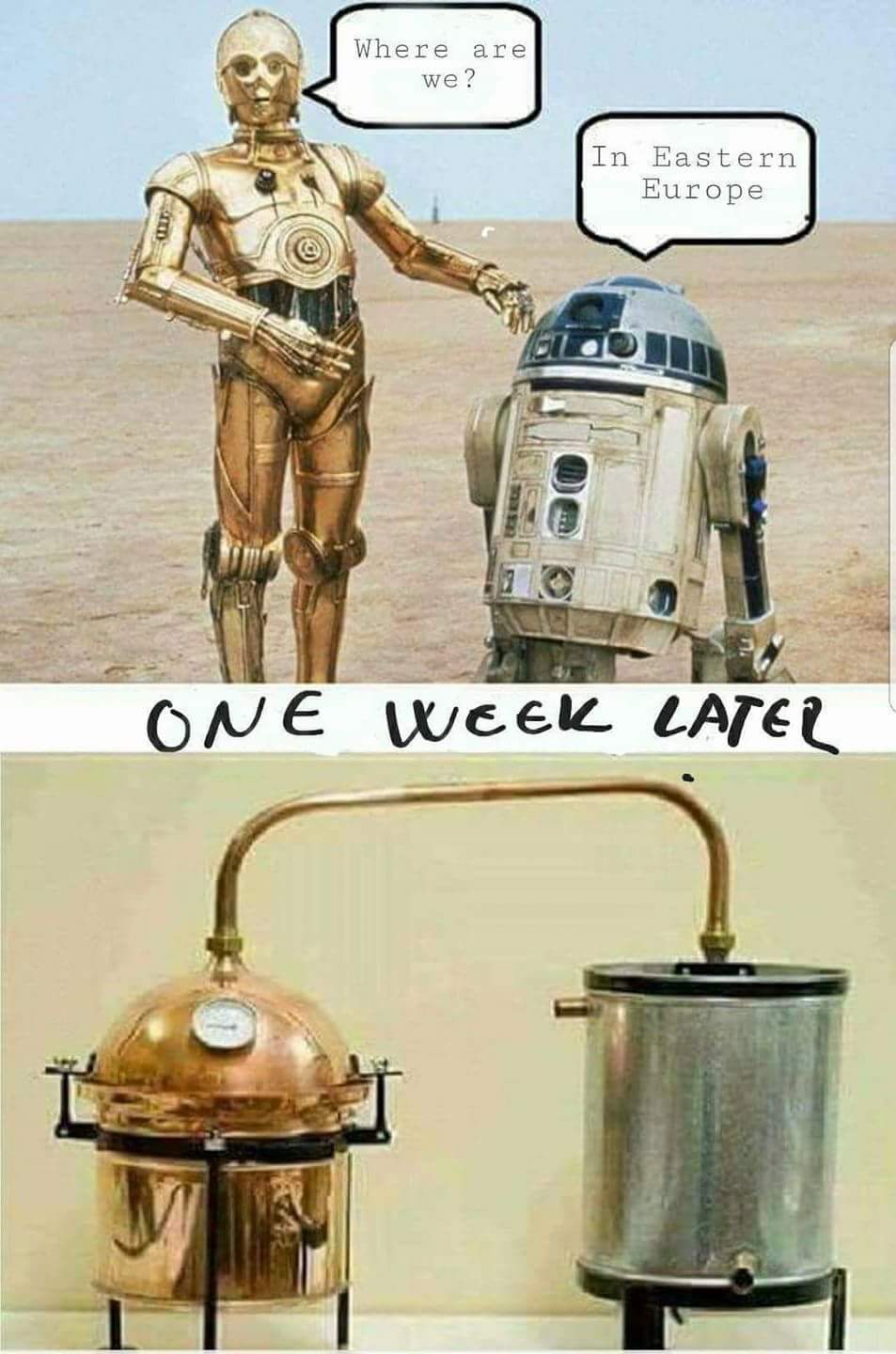
Croatia Coronavirus COVID-19 Health, Stats, & Travel Update: March 14, 2020
For the latest March 20 update click here.
March 14, 2020 - There are 37 confirmed cases of the coronavirus (COVID-19) in Croatia. Foreign nationals entering Croatia from infection hotspots will be subject to a 14-day quarantine, while a 14-day self-isolation is required for Croatian citizens.
Information on countries and areas under travel restrictions for passengers arriving in Croatia can be found here (courtesy of Croatia Airlines and updated March 12).
New Information for Passengers Entering Croatia
1) All foreign nationals entering the Republic of Croatia having visited the following countries/territories in the previous 14 days:
- Italy
- Iran
- China (Hubei province)
- South Korea (Daegu city and Cheongdo province)
- Germany (Heinsberg county in the state of North Rhine-Westphalia)
will be subject to compulsory 14-day quarantine at their own expense.
2) All foreign nationals entering the Republic of Croatia having visited the following countries/territories in the previous 14 days:
- France
- Sweden
- Switzerland
- Spain
- Germany (except area listed above)
- Austria
- Great Britain
- Netherlands
- China (except area listed above)
- South Korea (except area listed abouve)
- Japan
- Hong Kong
- Singapore
- Malaysia
- Bahrein
- Slovenia (area Bela Krajina)
will be subject to compulsory 14-day self-imposed isolation. Foreign nationals that do not have residence in the Republic of Croatia must have evidence of booked accommodation.
3) All Croatian citizens entering the Republic of Croatia who have visited countries/areas listed in 1) and 2) will be subject to compulsory 14-day self-imposed isolation/quarantine.
4) For some of the most commonly asked questions about coronavirus in Croatia, check out this TCN FAQ guide, which was published on March 14.
*Follow this page for updates on the coronavirus in Croatia from Total Croatia News. Contact numbers for epidemiologists, travel advisories and measures for preventing the spread of the coronavirus can be found here.
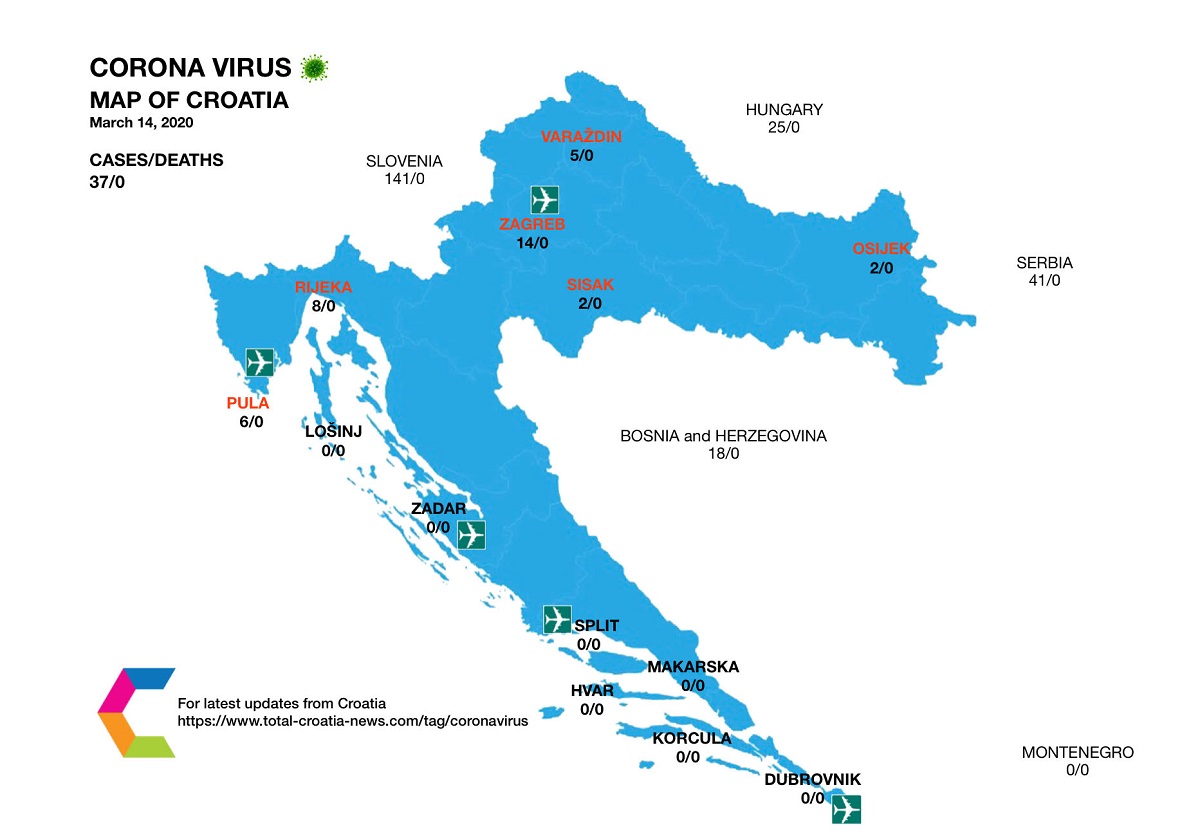
Thirty-Seven Coronavirus Cases in Croatia
As of March 14, 2020; thirty-seven coronavirus (COVID-19) patients have been reported in Croatia: 14 in Zagreb, 8 in Rijeka, 6 in Pula, 5 in Varaždin, 2 in Sisak and 2 in Osijek (Numbers on map updated).
- The first patient from Zagreb became infected during his stay in Italy. The two other patients are close contacts. The fourth patient recently returned from a ski trip in Austria. The fifth patient recently came back from a conference in Munich. Five new cases were confirmed Wednesday and Thursday and the patients returned from trips to Austria and Germany. Three more cases were confirmed on Friday: a child, a soldier and a contact of the soldier. Another case, confirmed Saturday, returned from Spain.
- A patient from Rijeka became infected during his stay in Italy. Several other patients had contact with the first patient. The total number of cases is now eight.
- The first patient from Varaždin spent time in Italy. The second case is a truck driver who had been in Italy and was in preventative self-isolation. The third and fourth cases are close contacts of the driver. A fifth case returned from the United States, via Europe.
- Six patients in Pula had returned from Italy.
- The first confirmed patient from Sisak returned from Italy. The second returned from Spain.
- Two new cases from Osijek were in contact with an infected person from Zagreb.
More than 5,547 people are dead from the virus, which originated in Wuhan City, China; and over 148,923 cases have been confirmed globally. There are 68,099 cases outside of mainland China and 17,660 in Italy.
UPDATED: March 14, 2020 14:00 CET (Central European Time)
Croatia National Civil Protection Headquarters Update
In Croatia, five new cases of coronavirus infection have been confirmed which brings the total number of cases to 37 as reported by Index. The National Civil Protection Headquarters reported the new cases at their morning briefing, which began at 8:45 CET. And the Ombudsman for Children appealed to the media to maintain high professional standards, especially when reporting on children.
COVID-19 Croatia Patients, Tests, Health Surveillance and Quarantines
So far, a total of 37 patients have been confirmed in the Republic of Croatia, two of whom have recovered.
So far, a total of 616 samples have been tested and 24 more are currently being tested. To date, 6300 people from areas affected by the new coronavirus have been placed under health surveillance. In Croatia, 47 persons are quarantined.
New Cases are Imported or Close Contacts
The Director of the Croatian Institute of Public Health (HZJZ) Krunoslav Capak emphasized that these were still cases of imported cases and close contacts of earlier confirmed patients.
The Director of the Civil Protection of the Republic of Croatia Damir Trut added that another person is expected to be confirmed during the day.
Second Twin Brother Recovered, Released
Capak also said the second twin brother, who was the first to be infected, has recovered. He is negative at the 48-hour test interval and will be released home during the day.
He reports that up to 500 people in Croatia have been tested so far. He said that everything is ready for testing at two locations in Zagreb, which would mean that 160 to 200 tests per location could be done in four shifts. "We can start right away. We have done some testing, and everything is working fine," he said.
Capak Addresses Border Crowds, Self-Isolation Orders
When asked about crowds at the border, Capak replied that they could not let people across the border without obtaining an order for self-isolation.
"From now on, border inspectors will not print the order, but will give official notices to those who arrive from countries marked as category two. The inspector only needs to take their first and last names, phone numbers and where they are traveling. This procedure will take two minutes. The official notices are being completed at HZJZ right now,” Capak said.
The form should be completed today, after which it will be distributed to border crossings.
Capak believes that it is far more important to enforce self-isolation control than penalties for violating self-isolation.
He confirmed reports about the migrant who did not adhere to self-isolation measures and indicated that it was a man from Syria who had returned from Austria.
"It's difficult to control in Porin (hotel near Zagreb designated for asylum-seekers), and this is non-disciplined person. We did our best to quarantine him, I don't know if we were successful. I'll get an update and provide a follow up later," he added.
Pirnat Dragicevic: Do Not Publish Information on Infected Children
Considering that there is one child from a kindergarten in Zagreb infected with the coronavirus so far; Ombudsman for Children Helenca Pirnat Dragicevic urged journalists and editors to adhere to the highest level of professional standards and to protect the welfare of the child in their reporting.
"The role of the media is extremely important, and one with great responsibility given that you play an important role in transmitting information. Children are not excluded from this situation, they are a vulnerable group and it is extremely important not to disclose a child’s information, identity, or disclose information that would allow the public to determine which child is involved, or which child came into contact with an infected person," she said.
It is important, as the ombudsman pointed out, that the approach isn’t sensationalist "which is certainly not in the public interest, and solely to the detriment of the child concerned."
Noting that the City of Zagreb had published information about the child and a kindergarten, she said that citizens and services should publish only verified information and protect the privacy of the child.
School Suspended for Two Weeks Starting Monday
As of Monday, classes in kindergartens, primary and secondary schools and higher education institutions will be suspended for two weeks. Distance learning will be organized by the Ministry of Science and Education. Children up to the age of 11 will be looked after in kindergartens and schools if both parents work and there is no other option.
Postponing, Cancelling Events Over 100 Recommended
It is recommended to further postpone any gatherings and organized gatherings which would be attended by more than 100 people. It is recommended that public events of sports or entertainment are not held at all (night clubs, concerts, etc.).
It is also recommended to hold sports competitions without spectators.
Croatia and Regional Daily Updates
(Updates provided by Index)
16:00 - Strict new measures have been announced for Istria, including the closing of all cafes and restaurants for a month from tomorrow. More on TCN here.
13:17 - Dubrovnik is suffering huge losses due to coronavirus, and the season has not even started.
13:13 - Serbian President Aleksandar Vucic called on citizens today to trust the country and not stockpile home supplies, saying that there are enough products "for a year" and that "no one will go hungry".
13:06 - Ivan Djikic, a member of the American Academy of Arts and Sciences, explained why so many people became infected in Italy in the short span of time.
"You are fighting an enemy, but you don't really know where it is. It happened in China. Then, through rigorous measures, they were able to do something that many admire. They were able to stop the danger on their territory. The virus was brought to Italy from China. And it was spread not by one patient, but by a dozen or even a hundred. Italy did not know about these cases because no one was doing the right epidemiological analysis of the people who were working in China," explained Djikic of Italy's problem in an interview on HRT.
12:45 - Another 16 people entered quarantine in Split last night.
12:43 - This is how the Zagreb Arena Center looked Saturday afternoon. Arena is one of the busiest shopping centres in Croatia.

Photo Credit | Index Reader
11:46 - European Parliament proposes new plan to help hospitals in Europe fight the coronavirus. Parliament Speaker David Sassoli said on Saturday that all European countries would receive assistance for their health systems.
This includes providing materials to hospitals and funding research to develop a coronavirus vaccine as soon as possible.
In addition, Sassoli announced financial assistance to help maintain jobs and keep the economy stable in the EU states. the European Union has provided at least 37 billion EUR to its members to assist with economic issues.
11:34 - Germany and Italy have increased respirator production in their respective countries to respond to the pandemic that is yet to come.
According to Reuters, Germany has ordered 10,000 respirators, while Italy has ordered 5 thousand respirators. One respirator is about 15,254 EUR.
10:40 - Zagreb Mayor Milan Bandic downplayed the risk of coronavirus infection at first. Now he has changed his tune and is paying for ads in the media which warn of the danger.
10:30 - Among the newly infected is a married couple from Slavonia. They were previously infected by a son-in-law. Everyone is in stable condition.
9:42 - Both twin brothers, the young men who were among the first infected in Croatia, have recovered from the coronavirus.
9:40 - The National Caterers Association has submitted a proposal for self-isolation measures and job placement in the hospitality industry. The proposal, signed by Marin Medak, president of the National Association of Caterers, was sent to President Milanovic, the government, the ministries of tourism, the police and economy, the City of Zagreb and the Croatian Chamber of Trades and Crafts.
9:20 - There are five new confirmed cases in Serbia.
Serbian President Aleksandar Vucic delivered bizarre address to the nation in which he tried to explain how they wanted to cheat Germany because of respirators.
9:00 - The new Slovenian government, which held its first session immediately after the parliamentary confirmation ceremony on Friday night, has set up a coronavirus epidemic headquarters with Prime Minister Janez Jansa at the helm. Every member of the government wore a face mask at the session.
8:45 - At the morning press conference of the National Civil Protection Headquarters, it was revealed that there are 37 recorded cases in Croatia, which includes 5 new cases.
7:30 - Hungary has introduced drastic measures. Prime Minister Viktor Orban said all schools were closing. He added that this would probably last for months.
(Updates provided by Index)
Live World Coronavirus Updates
- Live world updates from CNN here.
- Live world updates from The Guardian here.
- Live world updates from Al Jazeera here.
Live Health Organization Coronavirus Updates
- Live updated international map tracking spread of coronavirus from Johns Hopkins CSSE here.
- Live updates from the World Health Organization (WHO) here.
- Live updates from the Croatian Institute of Public Health (daily updates at 15:00 CET in Croatian) here.
Total Croatia News Coronavirus Coverage
- Coronavirus in Croatia: 5 New Cases Brings Total to 37, Initial 2 Patients Recovered - here.
- FAQ Coronavirus Croatia: Your Common COVID-19 Questions Answered - here.
- Konzum Prepared, Issues Request to Croatian Coronavirus Stockpilers - here.
- NP Krka: “National Park Open, Acting in Accordance with Instructions” - here.
- Minister Maric Sends Out Message to Croatia's Coronavirus Panic Buyers - here.
- Croatia National Team Will Not Gather in March, Euro 2020 Questionable - here.
UPDATED: March 14, 2020 14:00 CET (Central European Time)
For the latest March 20 update click here.
*Follow this page for updates on the coronavirus in Croatia from Total Croatia News. Contact numbers for epidemiologists, travel advisories and measures for preventing the spread of the coronavirus can be found here.
Flight Cancellations in Croatia: Ryanair Postpones Zadar Base until 2021
March 13, 2020 - Ryanair confirmed today (March 13, 2020) that its planned summer base in Zadar has been canceled due to the worsening situation with the COVID-19 virus and increased travel bans by the Government.
The base, which Lauda should manage on behalf of Ryanair, will now be delayed until the summer of 2021, reports Zadarski.hr.
“Ryanair regrets that the decision will result in a series of canceled flights. All affected passengers received email cancellation notifications. Concerned travelers will be able to choose between a full refund or a travel voucher that can be used on Ryanair flights within the next 12 months,” an official statement said.
“Ryanair continues to adhere fully to the guidelines of the WHO and national governments to ban travel. The situation is changing daily and all passengers on flights affected by travel bans or cancellations have received emails and are offered flight changes, full refunds, or travel bonuses,” added Ryanair.
"Ryanair apologizes sincerely to all our customers and our dear travelers for these disruptions caused by the COVID-19 virus and the government-imposed restrictions," they concluded.
To clarify, only passengers that have received notification that their flight is canceled are affected. If you have not received an email from Ryanair, there is no reason to panic. Flights booked for music festivals this summer, like Hideout, are still scheduled.
The Irish low-cost carrier officially notified Zadar Airport on Friday afternoon, when spokesperson Nikola Barac commented on the news for Zadarski.hr.
“Zadar Airport was informed by Ryanair that unfortunately, flights on individual routes were canceled due to the coronavirus. About 150 flights to multiple destinations have been canceled. The most canceled flights are from Dublin, London, Brussels and Stockholm, while some routes such as Vienna, Prague, Gothenburg, Dusseldorf and Karlsruhe depart according to the scheduled flight in late March and early April,” confirmed Barac.
The international flight season begins when Ryanair's summer flight schedule launches on March 29. This year, they announced connections to as many as 32 destinations, of which 12 are new.
“The effect of canceled flights on Zadar Airport traffic will range to about 25,000 arriving passengers or about 50 percent of traffic in April,” Barac said about how Zadar airport will suffer due to the cancellation of flights.
In addition to the daily TCN briefing, you can follow all aspects of TCN's coronavirus coverage in the dedicated COVID-19 section by clicking here.
Coronavirus Panic v Reality: Croatian Supermarket Shopping in Varazdin
March 13, 2020 - Experts say that panic surrounding coronavirus can be more dangerous that the virus itself. Amid news of panic Croatian supermarket buying, TCN visits three supermarkets in Varazdin to see the realities on the ground.
Even though TCN is enjoying record traffic at the moment (who would have thought mid-March, out of the tourist season and with no football happening, we would have more traffic than Croatia reaching the World Cup Final in July 2018), I will confess that I am not enjoying my job at the moment. I am also realising the ease and the power of fake news in a time of international panic. The conditions for clickbait and short-term Adsense gain are huge. As someone who has always been relaxed about my style of writing, I realise that this is a time to be careful about every word we publish. And with people searching for trustworthy sources of information, providing non-sensationalist, reliable information is what we are aiming for. One of the aims of this approach is to provide some kind of buffer against the understandable panic and hysteria that the current situation can easily create.
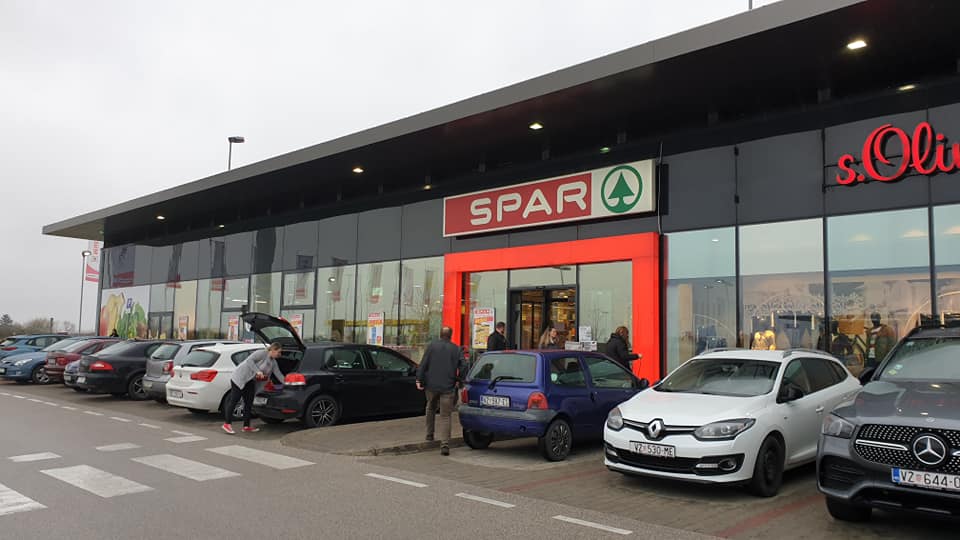
Stories of panic buying of items such as toilet paper have done the rounds all over the globe, with Australians distinguishing themselves in this particular sport.
Stories of panic buying in Croatian supermarkets have started to circulate, so I decided to see what the situation was on the ground this afternoon here in Varazdin, a city close to the Slovenian border. Varazdin has four confirmed cases of coronavirus and, along with the rest of Croatia, it was announced today that schools would be closed for an initial two weeks from Monday. So how was the panic buying in reality?
First stop, Spar.
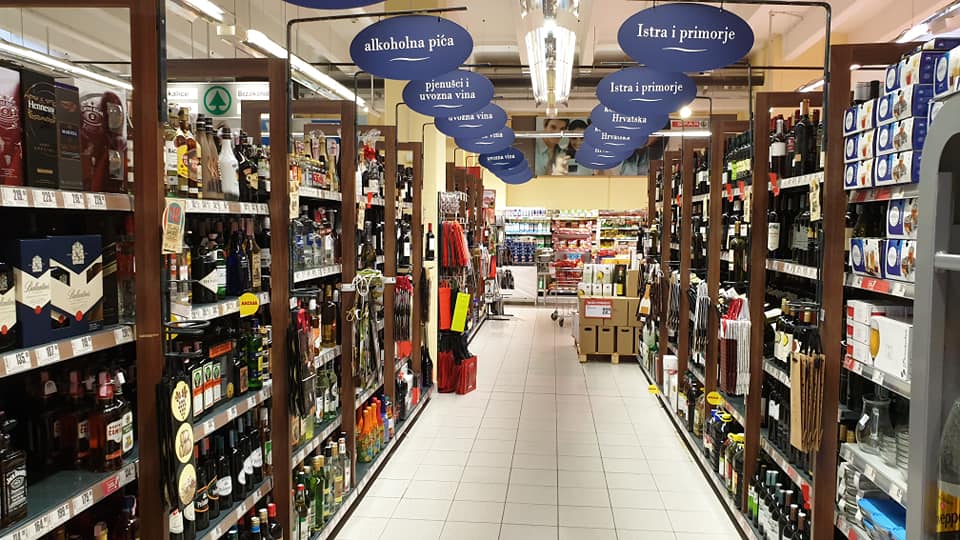
At least if there was no food, we would be able to drown our sorrows.
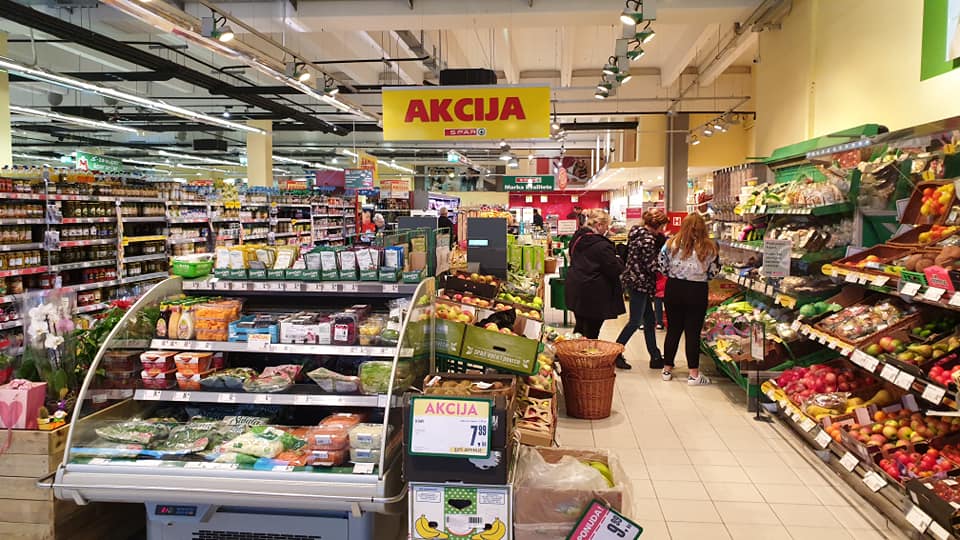
But food was indeed plentiful.
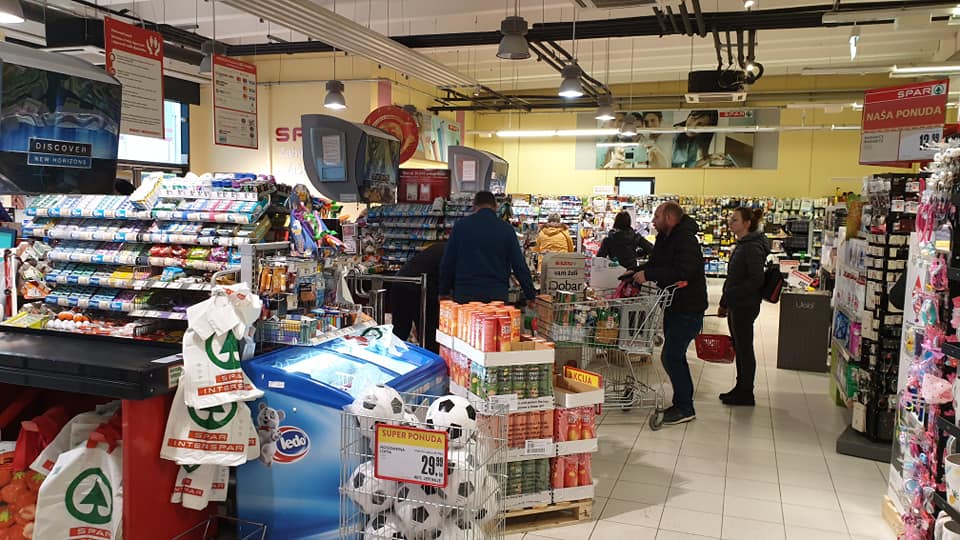
And, for from panic buying, trolleys were not overloaded, and queues were short.
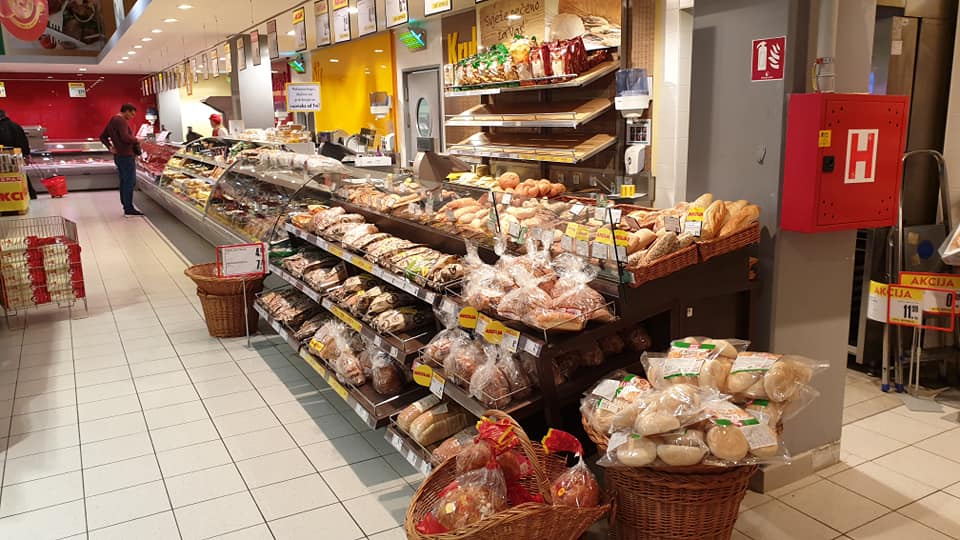
Bread was plentiful.
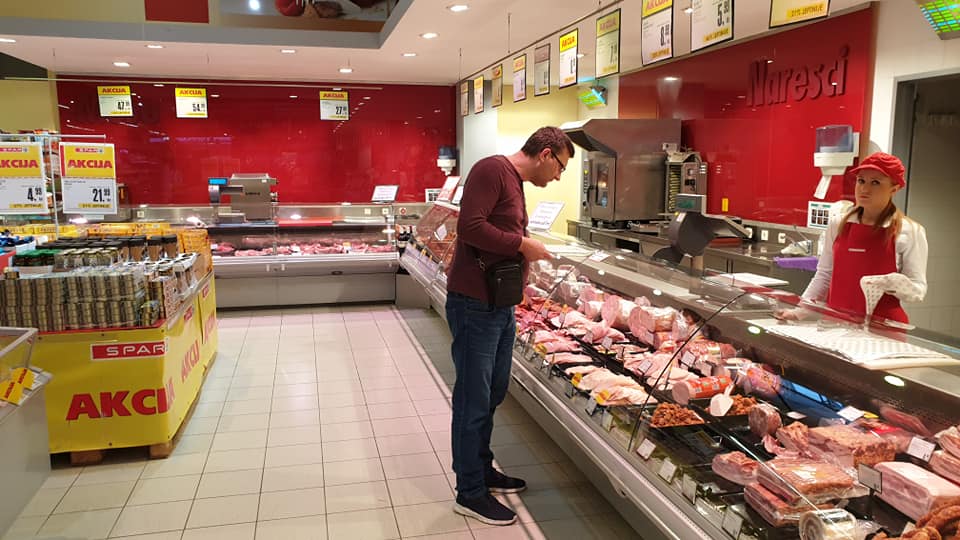
As was the selection of fresh meat.
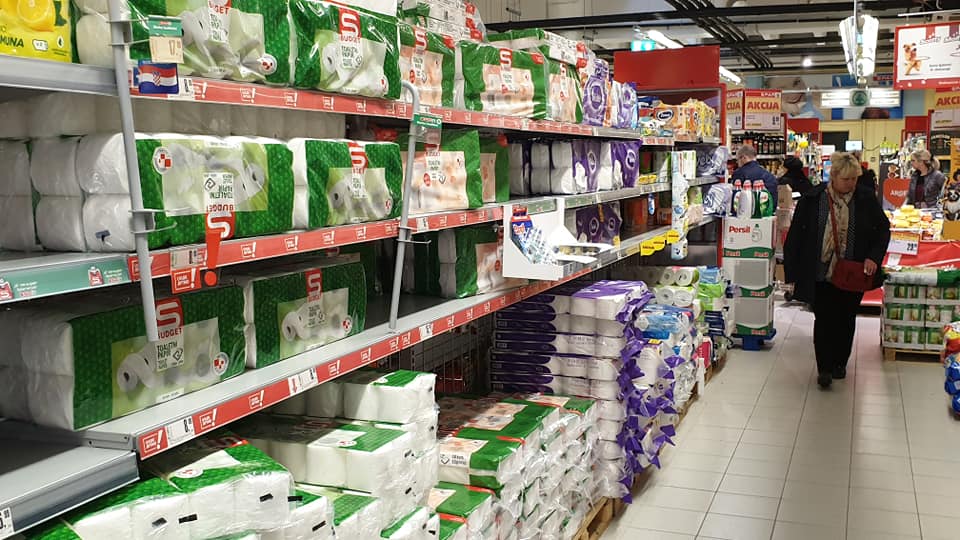
And then the most important item, it seems - are you watching, Australia?
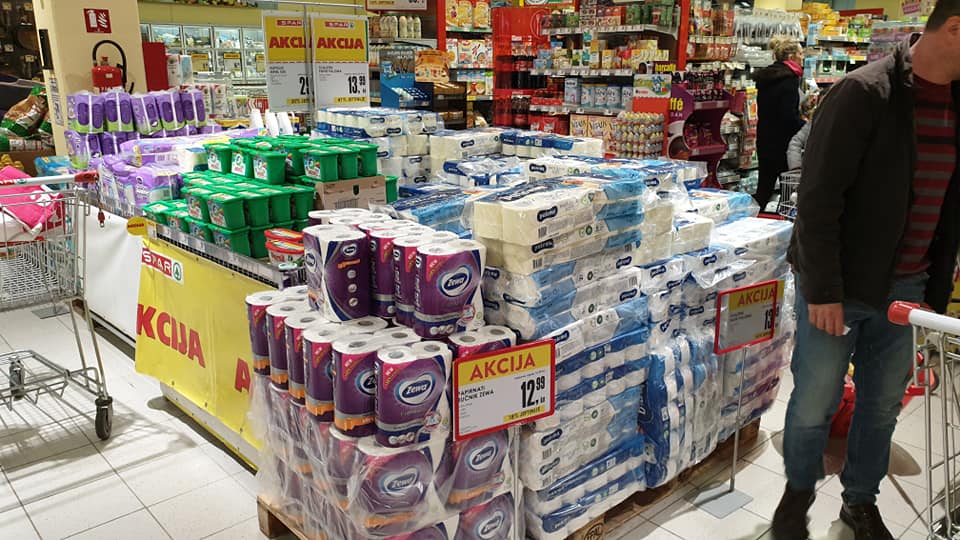
So much toilet paper, in fact, that there as an extra pallet in an aisle, with discount sales. Who would have thought!
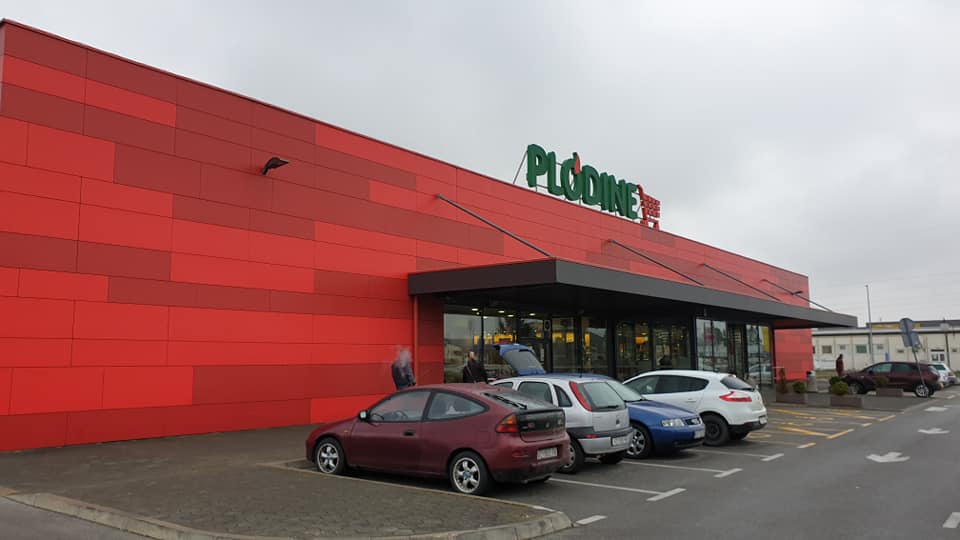
Off to Plodine.
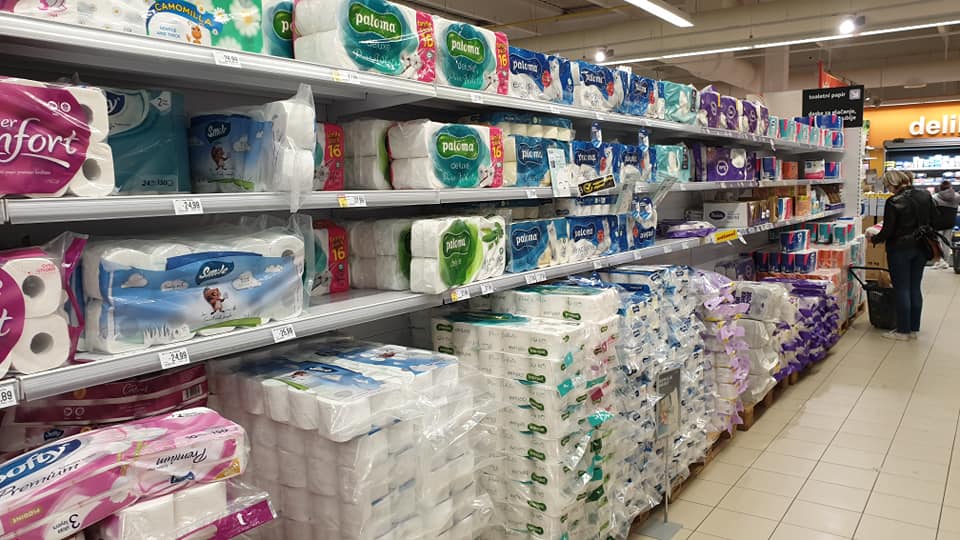
Toilet Paper Heaven!
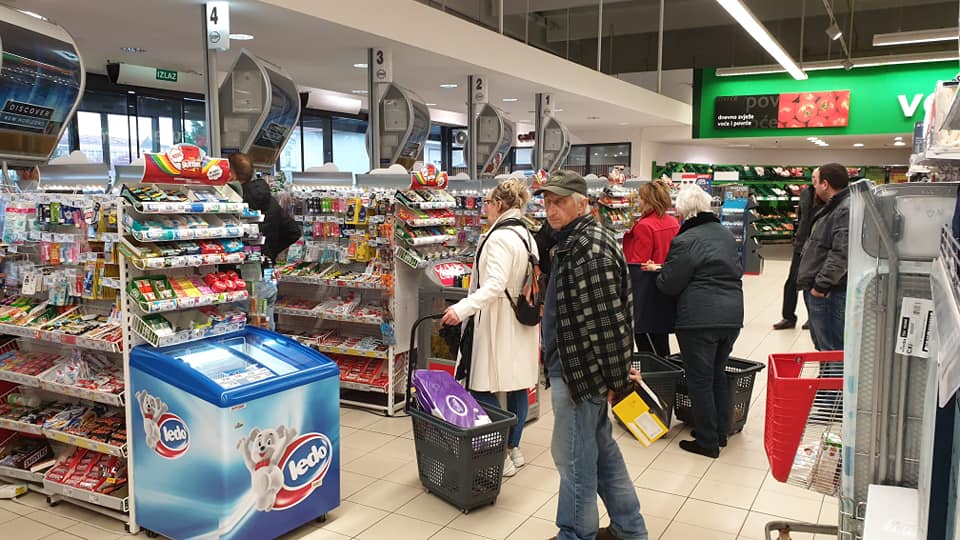
Nothing out of the ordinary about those queues.
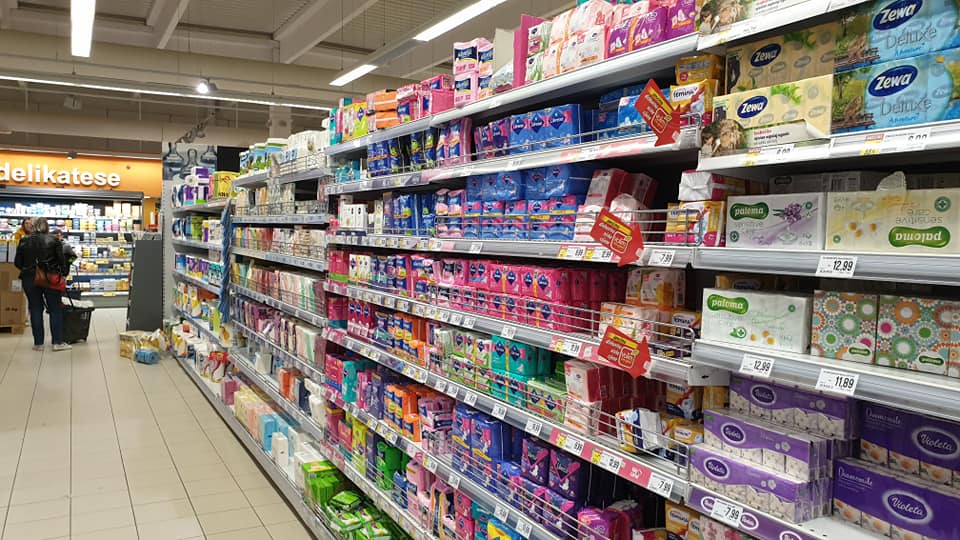
And plenty of tissues and other sanitaries.
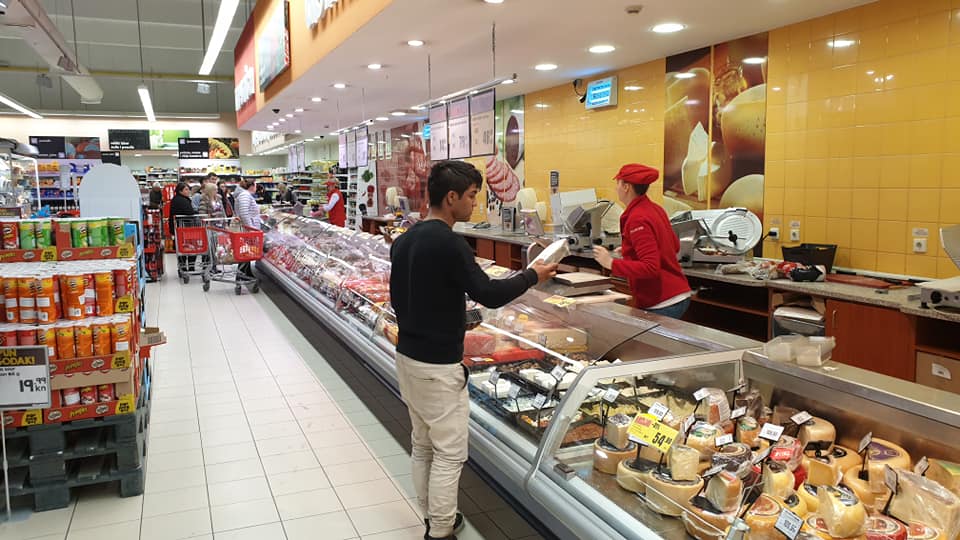
Plenty of choice to stock up on.
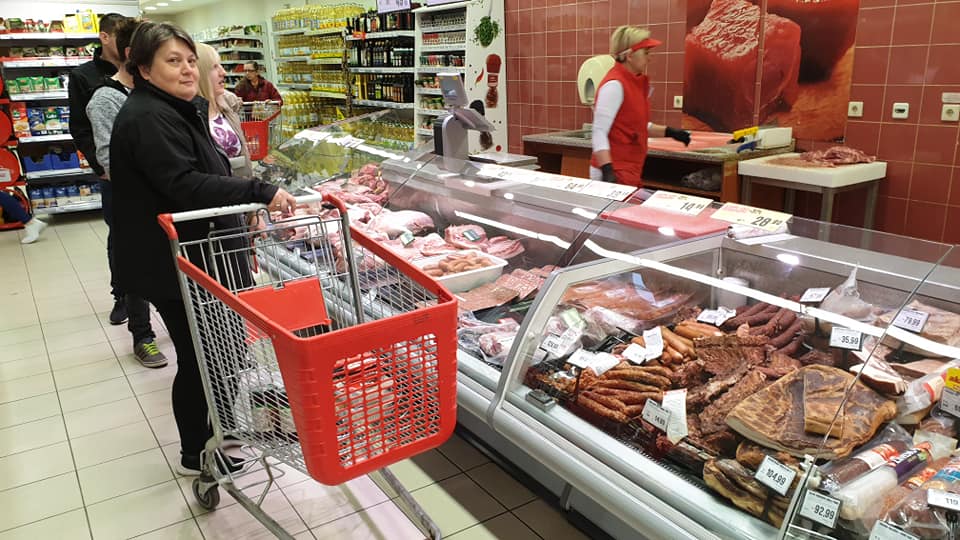
Including a healthy meat selection.
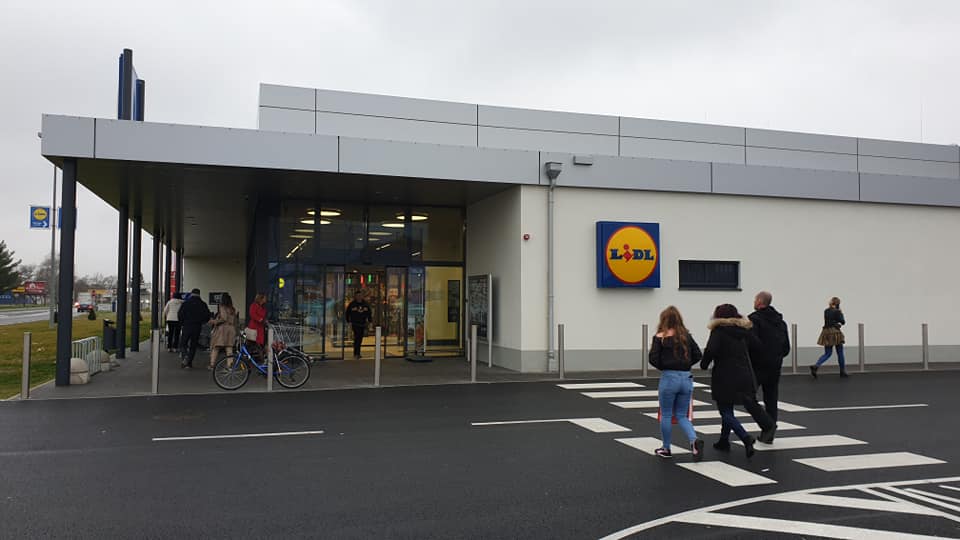
Off to Lidl.
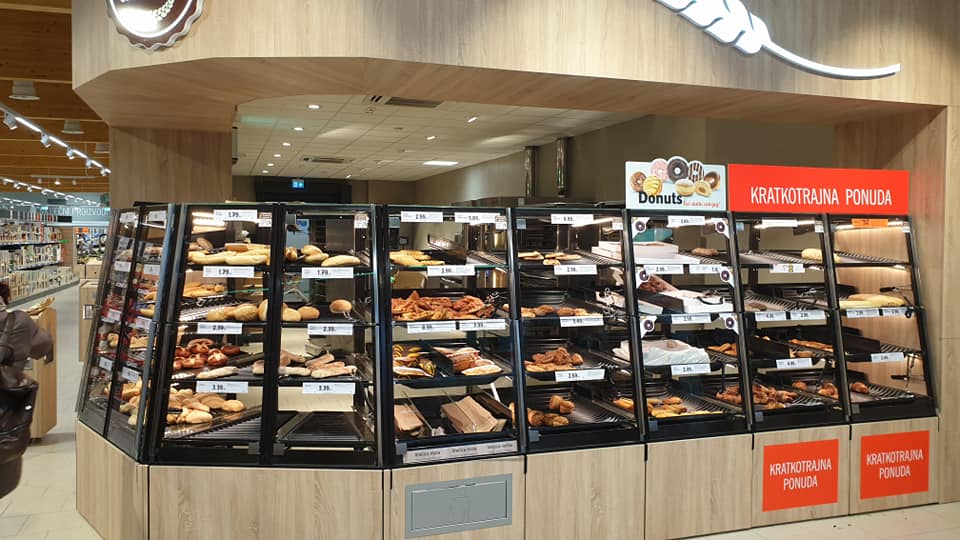
A nice welcoming bread selection.
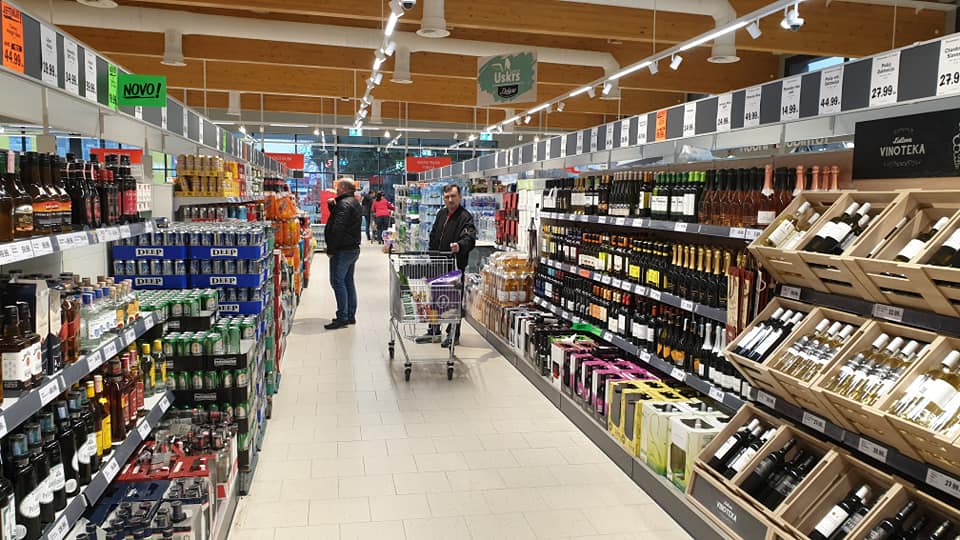
I fought my way through the panicked crowds.
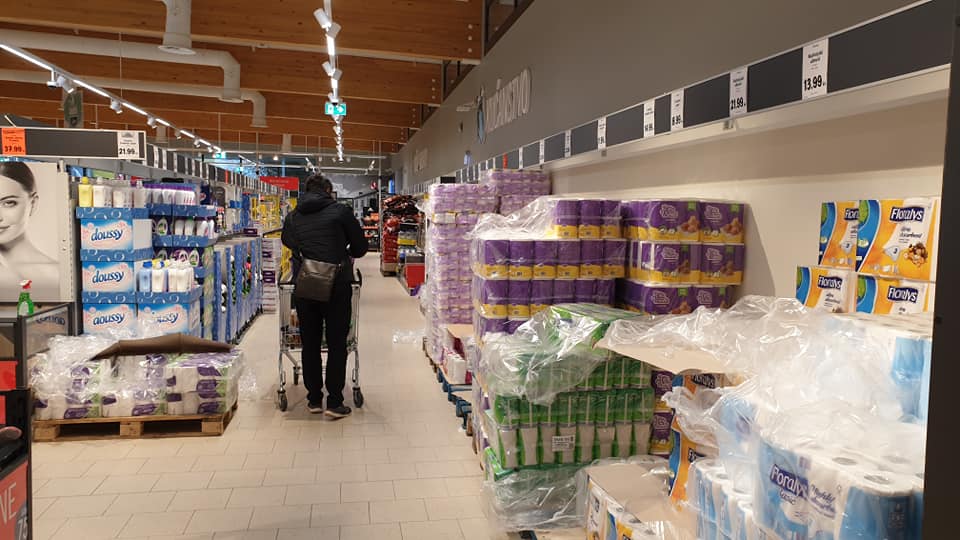
Mercifully, for any visiting Australian tourists, there was still some dunny paper for sale.
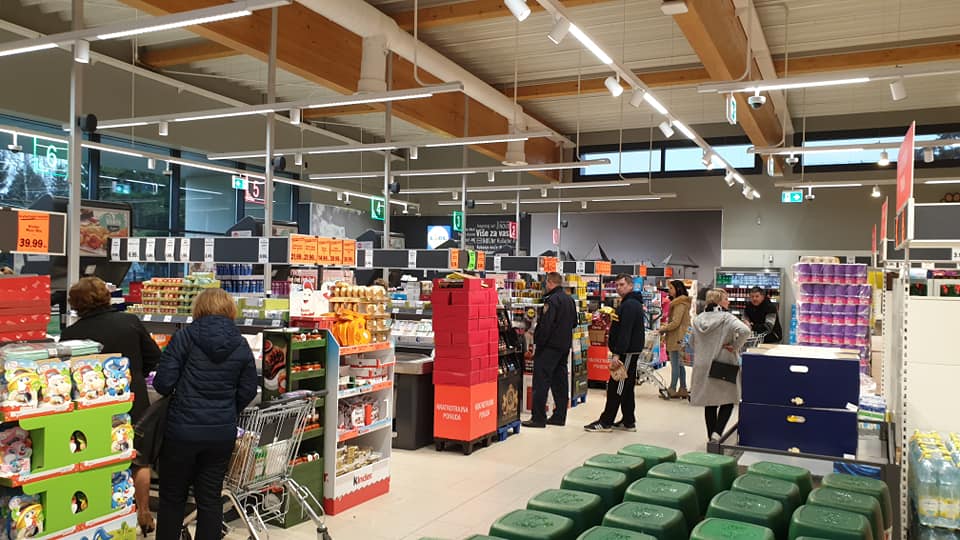
And the sort of waiting time that this impatient shopper can deal with.
Keep Calm and Carry On. Croatians know well how to survive hardship and crisis, as their recent wartime experiences will attest to. If hard times come, Croatians will adapt, as they always do. The situation here in Varazdin is very calm, and as long as we all stay calm, we will avoid the panic. And if we avoid the panic, half the battle is won.
For the latest on the coronavirus crisis in Croatia, follow the dedicated TCN section.
Milanović: No Mistake Made in Dealing with Coronavirus
ZAGREB, March 13, 2020 - President Zoran Milanović said on Friday he was refraining from commenting on coronavirus because he felt that his interventions would cause confusion and he was confident the government had not made one mistake about it so far.
Speaking to reporters, the president said he still felt it was his duty to say something. He said he was talking with the prime minister and the head of the national civil protection authority and that he was being briefed about everything.
He said coronavirus was also a political issue and one on which even experts did not see eye to eye. "The approach to solving with this problem and dealing with this challenge isn't the same in every state, independently of their economic development, tradition, culture, the epidemiology of the public health sector."
The president said he feared it might never be known what happened in northern Italy, where the first oversight was made, and that this would make analyses harder. "When we see what happened in such a developed and wealthy state, then we see that luck plays a very important part, as do permanent action and analysis."
Asked if he thought kindergartens, schools and faculties should have been closed earlier, the president said he supported it and that it was good that a decision to that effect was made now.
"You have no one to clearly look up to. You must take responsibility. It depends from state to state. This is the Croatian approach. It's in force as of yesterday and I believe it has its logic. We don't know many things."
The president underlined the importance of people keeping 1.5 m apart, as recommended by the Croatian Institute of Public Health. "People will have to, especially in the next two weeks, withdraw into their nucleus a little, into the family, go out less. This can't be fully stopped, but we'll have to socialise and communicate less. That's the reality."
He also commented on empty shelves in supermarkets across the country due to mass shopping. "If (people) don't do it, they will have to leave the house more often, so it's good that they buy as much as they can in a couple of days. That's not panic," he said, adding that "we must create conditions for a life indoors, isolated... with all its limitations. Unfortunately, that's the way it is."
The president said he was confident there was no danger of a greater panic but that one could read and hear all sorts of things in the media "and people are easily influenced."
He hopes that in Croatia the epidemic will peak in the next two weeks and then start decreasing. He said the situation in Croatia was different than in other countries and that for now he supported the closure of schools.
More coronavirus news can be found in the Lifestyle section.
Strategic Stockpiles Enough for 30 days in Worst Case Scenario
ZAGREB, March 13, 2020 - Strategic buffer stocks in Croatia total HRK 537 million and are enough to supply the entire population for 30 days and if Croatia were quarantined, the necessary range of buffer stocks would be activated, the Economy Ministry said on Friday.
Strategic buffer stocks ensure the most basic needs during and after the initial impact based on the type of natural or other disaster and they comprise food and non-food products.
Food products are wheat, corn, rice, pasta, meat, canned meat and fish, bottled drinking water, whole day food rations, salt, sugar, oil, cheese, powdered milk, baby food, powdered eggs, jam, frozen and canned fruit.
Non-food products include oil products, container homes, water tank trucks, rescue vessels, water pumps, and hydraulic rescue tools.
Buffer stock warehouses are located around the country.
In early February, Buffer Stocks started supplying the Health Ministry with antiviral suits and masks to deal with coronavirus and delivering containers to border crossings for the needs of sanitary inspectors.
The Economy Ministry said the situation was under control and advised all the citizens to continue to follow the recommendations of the national civil protection authority.
More coronavirus news can be found in the Lifestyle section.
City of Split on Coronavirus: Don't Panic, Follow Instructions, Help Your Grandparents
March 13, 2020 - The City of Split and Mayor Andro Krustolovic Opara address citizens on the coronavirus outbreak.
“In accordance with the decision of the Ministry of Health to declare the danger of an epidemic of infectious disease COVID-19, and in order to prevent the spread of the disease, the City of Split temporarily changes its working hours to work with parties in the administrative bodies of the city administration.
From Monday, March 16, 2020, all communications from the City Administration will be made by telephone and email. Parties will be received at the offices exclusively at the times agreed upon by telephone or email. Central Office hours remain unchanged, every working day from 8 am to 3 pm. Also, the office hours of the City Treasury remain unchanged, from 8 am to 12 pm. We remind you that invoices can be paid at all OTP Bank branches free of charge.
City companies, Split Vodovod and Sewerage, Split Čistoća and Split Parking have also called on service users to communicate by telephone or e-mail, all with a view to suppressing coronaviruses, protection, and employees and citizens.
City institutions in culture, according to the instructions of the Headquarters, postponed all the planned events, and all sports events in the sports facilities of the City of Split are postponed.
Employees of the city government, city companies and city institutions continue to carry out their regular jobs on a regular basis, and all these measures, according to the recommendation of the Ministry of Health and the National Headquarters, must be introduced to protect all citizens.
City institutions in the culture, according to the instructions of the Headquarters, postponed all the planned events and events, and all sports events in the sports facilities of the City of Split are postponed.
Employees of the city government, city companies and city institutions continue to carry out their regular jobs on a regular basis, and all these measures, according to the recommendation of the Ministry of Health and the National Headquarters, must be introduced to protect all citizens.
According to the Decision of the Government of the Republic of Croatia, as of Monday, March 16, there will be no teaching in primary and secondary schools or colleges. The Ministry of Science and Education will organize the classes electronically, which all parents and students have already received or will receive instruction in their schools, which are ready to teach according to the Ministry's instructions. The elementary schools of the City of Split will receive lower-grade students who cannot be provided with care by their parents from 8 am to 4 pm.
The kindergartens co-founded by the City of Split (DV Cvit Mediterranean, DV Grigor Vitez, DV Radost and DV Marjan) will also be open Monday for children whose parents work and cannot arrange for home care. We encourage parents to request detailed information at the schools and kindergartens their children attend.”
Information and instructions for citizens on how to behave if they have coronavirus symptoms and preventive measures have been published on the website of the City of Split," said the City.
Mayor Andro Krustolovic Opara also addressed the people of Split.
“We are facing a situation that needs to be addressed with utmost prudence, responsibility, and solidarity.
I know that I should tell you "don't panic", and indeed, with our Ministry of Health and the National Headquarters, which has been leading the lead well since the beginning of this crisis, and we should not panic but listen to them and act in accordance with their instructions. However, I understand the fear of the unknown, the emptying of shops and pharmacies,… Keep in mind that all measures taken are aimed at preventing and preventing the spread of the infection, so we are obliged to respect them all.
I would ask our youngest fellow citizens to listen to their parents and seniors and to follow their school responsibilities from home. I know it's a good time and you would most like to go out and play. Patience, the time will come for this as soon as this virus passes, and it will happen quickly if we are all responsible and obey the instructions of our crisis staff. Help grandparents avoid having to go outside or shop because we have to keep them safe the most because they are the most sensitive.
Dear fellow citizens, it is up to us to act responsibly, to ourselves and to the society in which we live. Only if we listen to the professionals and respect the measures that those responsible give us, life in Split, Dalmatia and in Croatia, and ultimately the whole world, will soon return to normal,” said Mayor Andro Krstulovic Opara.
In addition to the daily TCN briefing, you can follow all aspects of TCN's coronavirus coverage in the dedicated COVID-19 section by clicking here.

